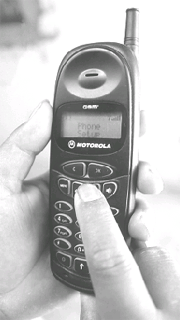Mobile disruption
 while some scientists would dismiss such claims, studies show emissions of microwaves from cellular telephones have a variety of strange effects on living tissue that cannot be reconciled with conventional radiation biology. One of the weirdest effects comes from the now famous "memory loss' study, published in the International Journal of Radiation Biology (Vol 75, No 4). Alan Preece and his colleagues at the University of Bristol, uk , clamped a device that mimicked the microwave emissions of analogue or digital mobile phones to the left ear of volunteers. Contrary to the media reports on short-term memory, switching the device on or off made no difference to the volunteers' ability to recall words and pictures that were shown on a computer screen. Preece says it is too early to comment on the effects of using a cellphone. But he rules out the suggestion that mobiles have an immediate effect on our cognitive abilities. "I am pretty sure there is no effect on the short-term memory,' he says.
while some scientists would dismiss such claims, studies show emissions of microwaves from cellular telephones have a variety of strange effects on living tissue that cannot be reconciled with conventional radiation biology. One of the weirdest effects comes from the now famous "memory loss' study, published in the International Journal of Radiation Biology (Vol 75, No 4). Alan Preece and his colleagues at the University of Bristol, uk , clamped a device that mimicked the microwave emissions of analogue or digital mobile phones to the left ear of volunteers. Contrary to the media reports on short-term memory, switching the device on or off made no difference to the volunteers' ability to recall words and pictures that were shown on a computer screen. Preece says it is too early to comment on the effects of using a cellphone. But he rules out the suggestion that mobiles have an immediate effect on our cognitive abilities. "I am pretty sure there is no effect on the short-term memory,' he says.
But the microwaves did have one completely unexpected effect: they decreased the time subjects took to react to words flashed onto the screen. When "yes' or "no' was displayed, the volunteers were quicker at pressing a matching button if the headset was switched on. The improvement was small
Related Content
- Economic development in Africa report 2023
- Forgone health care during the COVID-19 pandemic: 2020 and 2021 survey trends from 25 Developing Countries
- Expanding opportunities: toward inclusive growth- South Asia Economic Focus, Spring 2023
- Mobility and development, Spring 2023: innovations, policies, and practices
- Sierra Leone economic update 2022: leveraging SME financing and digitization for inclusive growth
- Climate finance in the agriculture and land use sector: global and regional trends between 2000 and 2018
